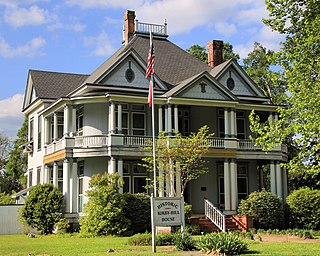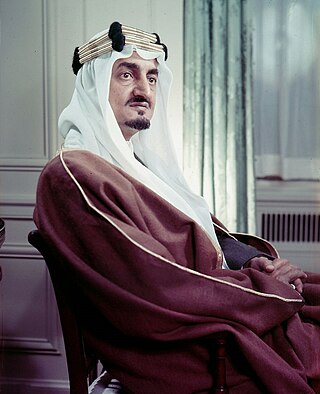Related Research Articles

Kountze is a city in and the county seat of Hardin County, Texas, United States. The population was 1,981 at the 2020 census. The city is part of the Beaumont–Port Arthur Metropolitan Statistical Area.

Faisal bin Abdulaziz Al Saud was a Saudi Arabian statesman and diplomat who was King of Saudi Arabia from 2 November 1964 until his assassination in 1975. Prior to his ascension, he served as Crown Prince of Saudi Arabia from 9 November 1953 to 2 November 1964, and he was briefly regent to his half-brother King Saud in 1964. He was prime minister from 1954 to 1960 and from 1962 to 1975. Faisal was the third son of King Abdulaziz, the founder of modern Saudi Arabia.

Saudi Arabia, officially the Kingdom of Saudi Arabia (KSA), is a country in West Asia. It covers the bulk of the Arabian Peninsula, and has a land area of about 2150000 km2, making it the fifth-largest country in Asia, the second-largest in the Arab world, and the largest in West Asia and the Middle East. It is bordered by the Red Sea to the west; Jordan, Iraq, and Kuwait to the north; the Persian Gulf, Qatar and the United Arab Emirates to the east; Oman to the southeast; and Yemen to the south. Bahrain is an island country off its east coast. The Gulf of Aqaba in the northwest separates Saudi Arabia from Egypt and Israel. Saudi Arabia is the only country with a coastline along both the Red Sea and the Persian Gulf, and most of its terrain consists of arid desert, lowland, steppe, and mountains. Saudi Arabia's capital and largest city is Riyadh; the kingdom also is the location of Islam's two holiest cities of Mecca and Medina.

Khalid bin Abdulaziz Al Saud was a Saudi Arabian statesman and politician who served as King and Prime Minister of Saudi Arabia from 25 March 1975 to his death in 1982. Prior to his ascension, he was Crown Prince of Saudi Arabia from 29 March 1965 to 25 March 1975. He was the fifth son of King Abdulaziz, the founder of modern Saudi Arabia.

Saud bin Abdulaziz Al Saud was King of Saudi Arabia from 9 November 1953 until his abdication on 2 November 1964. During his reign, he served as Prime Minister of Saudi Arabia from 1953 to 1954 and from 1960 to 1962. Prior to his accession, Saud was the country's crown prince from 11 May 1933 to 9 November 1953. He was the second son of King Abdulaziz, known as Ibn Saud, the founder of Saudi Arabia.
Saud bin Abdulaziz Al Saud ruled the First Saudi State from 1803 to 1814. Saud annexed Mecca and Medina from the Ottoman Empire making him the first Al Saud ruler who received the title of the servant of the Two Holy Cities. During his rule the state experienced a significant level of strength and expansion for which he was called Saud Al Kabeer or Saud the Great.

Warith Deen Mohammed, also known as W. Deen Mohammed, Imam W. Deen Muhammad and Imam Warith Deen, was an African-American Muslim leader, theologian, philosopher, Muslim revivalist, and Islamic thinker.

Saud bin Faisal Al Saud, also known as Saud Al Faisal, was a Saudi Arabian statesman and diplomat who served as the foreign minister of Saudi Arabia from 1975 to 2015. A member of the Saudi royal family, he was the longest-serving foreign minister in world history.

Adel Al-Jubeir is a Saudi diplomat who is the former Saudi Minister of Foreign Affairs and the current Saudi Minister of State for Foreign Affairs. He is the second person not belonging to the House of Saud to hold the office, after Ibrahim bin Abdullah Al Suwaiyel. He previously served as the Saudi Ambassador to the United States from 2007 to 2015, and was also a foreign policy advisor to King Abdullah.
Faisal bin Turki Al Saud was the second ruler of the Second Saudi State and seventh head of the House of Saud.
Safar bin Abdul-Rahman al-Hawali al-Ghamdi is a scholar who lives in Mecca. He came to prominence in 1991, as a leader of the Sahwah movement which opposed the presence of US troops on the Arabian peninsula. In 1993, al-Hawali and Salman al-Ouda were leaders in creating the Committee for the Defense of Legitimate Rights, a group that opposed the Saudi government, for which both were imprisoned from 1994 to 1999.

Yasir Qadhi is an American preacher, theologian, and Sunni imam. Since 2001, he has served as Dean of Academic Affairs at the Al-Maghrib Institute, an international Islamic educational institution with a center in Houston, Texas. He also taught in the Religious Studies department at Rhodes College in Memphis, Tennessee. He is currently the resident Da'i of the East Plano Islamic Center in Plano, Texas. He currently serves as the chairman of the Fiqh Council of North America.

Bilateral relations between Saudi Arabia and the United States began in 1933 when full diplomatic relations were established and became formalized in the 1951 Mutual Defense Assistance Agreement. Despite the differences between the two countries—an Islamic absolute monarchy, and a secular constitutional republic—the two countries have been allies ever since. The core logic underpinning the relationship is that the United States of America (U.S.) provides military protection of the Kingdom in exchange for a reliable oil supply from the Saudis, pricing of oil in U.S. dollars, and Saudi support for American foreign policy operations across the world. Ever since the modern relationship began in 1945, the U.S. has been willing to overlook some of the kingdom's domestic and foreign policy aspects such as Wahhabism, its human rights, and alleged state-sponsored terrorism as long as it maintained oil production and supported American national security policies. The high point in relations was marked by the Gulf War (1990–1991), when an international coalition led by United States and Saudi Arabia fought a successful military campaign in response to Saddam Hussein's invasion of Kuwait.

Abdullah bin Abdulaziz Al Saud was King and Prime Minister of Saudi Arabia from 1 August 2005 until his death in 2015. Prior to his ascension, he was Crown Prince of Saudi Arabia since 13 June 1982. He was the tenth son of King Abdulaziz, the founder of Saudi Arabia.

The September 11 attacks were carried out by 19 hijackers of the militant Islamist terrorist organization al-Qaeda. In the 1990s, al-Qaeda leader Osama bin Laden declared a holy war against the United States, and issued two fatāwā in 1996 and 1998. In the 1996 fatwā, he quoted the Sword Verse. In both of these fatāwā, bin Laden sharply criticized the financial contributions of the American government to the Saudi royal family as well as American military intervention in the Arab world.

Saudi Americans are Americans of total or partial Saudi descent. According to the 2000 census, 7,419 people of Saudi origin were living in the United States of America (USA). In 2015, according to the American Community Survey, 96,783 Saudi-born people were living in the USA. The Kingdom of Saudi Arabia (KSA) and the USA have had important political relations since the 1940s. Population estimates are seen to have a very small diaspora, mainly because the KSA provides native Saudis with more than adequate welfare benefits, removing the need to live and work in other developed countries.

Michael Jay Wildes is an American immigration lawyer and politician who serves as the 38th and current Mayor of Englewood, New Jersey. He previously served as the 36th Mayor of Englewood from 2004 to 2010. A member of the Democratic Party, Wildes served as a Federal Prosecutor for the Eastern District of New York and as a City Councilman for Englewood before he was elected mayor in 2003. He was reelected in 2006 and again in 2018. A nationally recognized authority on American immigration law, Wildes has had success in defending the immigration rights of his clients, some of whom are celebrities. Wildes is the managing partner of the law firm Wildes and Weinberg PC. He also serves as immigration counsel to Davidoff Hutcher and Citron LLP, and Lincoln Center for the Performing Arts.
Starting in the mid-1970s and 1980s, Salafism and Wahhabism — along with other Sunni interpretations of Islam favored by the Kingdom of Saudi Arabia and other Gulf monarchies — achieved a "preeminent position of strength in the global expression of Islam."

The Saudi–led intervention in Bahrain began on 14 March 2011 to assist the Bahraini government in suppressing an anti-government uprising in the country. The intervention came three weeks after the U.S. pressured Bahrain to withdraw its military forces from the streets. As a decision by Gulf Cooperation Council (GCC), the intervention included sending 1,000 (1,200) troops with vehicles from Saudi Arabia at the invitation of the Al-Khalifa ruling family, marking the first time the GCC used such a collective military option for suppressing a revolt.
Following the embargo by Arab oil exporters during the Israeli-Arab October 1973 War and the vast increase in petroleum export revenue that followed, the international propagation of Salafism and Wahhabism within Sunni Islam favored by the conservative oil-exporting Kingdom of Saudi Arabia and other Gulf monarchies achieved a "preeminent position of strength in the global expression of Islam." The Saudi interpretation of Islam not only includes Salafiyya but also Islamist/revivalist Islam, and a "hybrid" of the two interpretations.
References
- ↑ Bruce Taylor Seeman, "MUSLIM SCHOOL GETS HELP FROM TEXAS TOWN'S MAYOR \ THE NATION'S FIRST MUSLIM MAYOR VISITED NORFOLK TO HELP THE SCHOOL RAISE MONEY", The Virginian-Pilot (archive), February 21, 1993